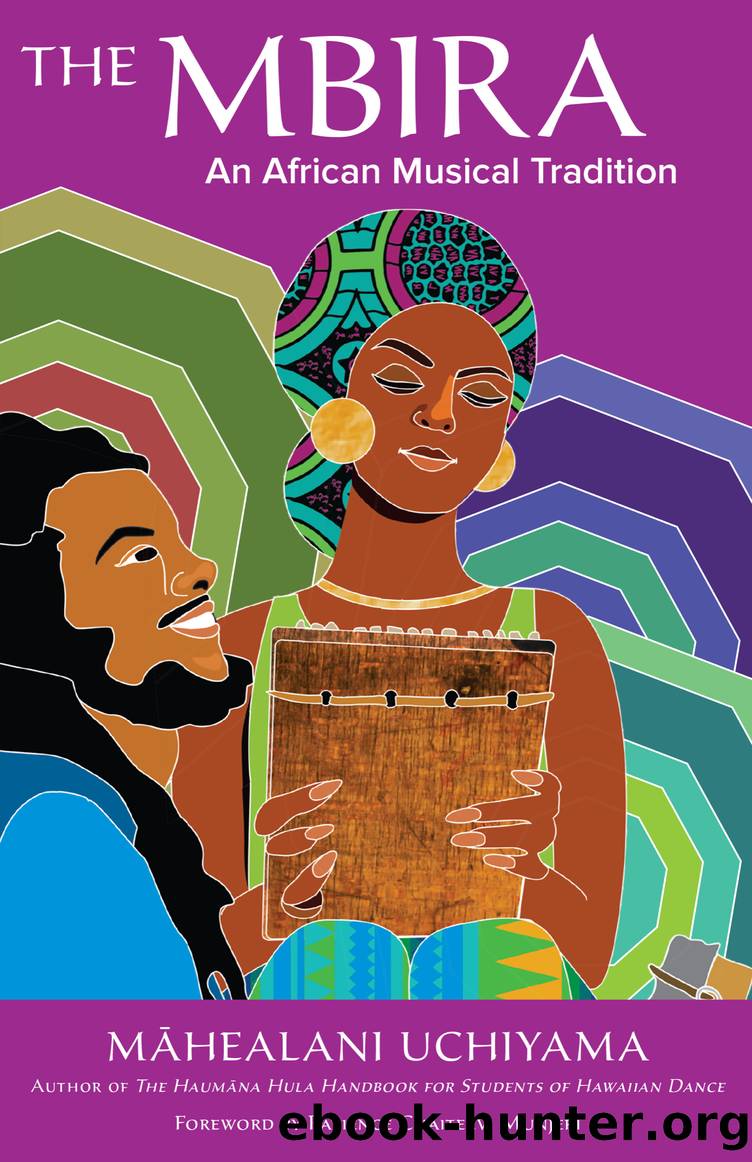The Mbira by Mahealani Uchiyama

Author:Mahealani Uchiyama [,]
Language: eng
Format: epub
ISBN: 9781623176501
Publisher: North Atlantic Books
The Chimurenga
Charwe Nyakasikana, spirit medium of Nyamhita Nehanda.
The word âChimurengaâ is derived from the name of an early ancestor warrior of the Shona people, Murenga. It became the name of the struggle to rid the country of settlers. The struggle was assisted by the ancestors, who were channeled through spirit mediums. In accordance with Shona beliefs, these powerful spirit mediums inspired the combatants to rise up and drive the settlers away. The most dynamic of these was a young woman by the name of Charwe Nyakasikana, the spirit medium of Nyamhita Nehanda.
Nyamhita Nehanda is a powerful, royal ancestral spirit (mhondoro) of antiquity. Associated with the Mazowe Valley in the Mashonaland Central Province of Zimbabwe, she is the revered female spirit who brings rain, and upon whom, therefore, the landâs fertility depends. At a time of great turmoil for her people, Nehanda chose to speak through a young woman named Charwe Nyakasikana. Charwe, though young, was married with children at the time she became the spirit medium for Nehanda. She was one of three spirit mediums (the other two being Mukwati and Kaguvi, both male) who directed the freedom fighters with how and where to engage. She became known as someone to be reckoned with, especially as it was she who channeled the deeply respected spirit of Nehanda.
Toward the end of the first Chimurenga, Charwe-Nehanda was captured, and Kaguvi surrendered. She was accused of the murder of a European commissioner, tried, found guilty, and sentenced to death.
Reports indicate that she did not take her situation quietly, remaining combative till the very end. Charwe-Nehanda was hanged in the present-day city of Harare on April 27, 1898, vowing that her bones would rise again to lead her people in the struggle against European colonialism. She was thirty-six years old.
With the uprising behind them, Cecil Rhodes and his regime resumed their campaign to strip the Shona of material evidence of their rich cultural history, destroying artifacts deemed worthless and repurposing the meaning of what was left. The territory then known as Southern Rhodesia became self-governing by 1923 with voting rights tied to property ownership. Thus, Indigenous people were denied voting rights because their land was held communally, rather than owned by individuals.
Among the settlers, rumors began to spread of a kind of exotic music heard in the villages that was capable of inducing trance, and that had both comforted and strengthened the warriors of the uprising. Later the settlers would come to understand that for the Shona this music was indeed a form of prayer and of connection among the living as well as between the living and the spirits.
In no small part because of its role in emboldening Indigenous peoples in their struggle against those who sought to dismantle their culture and sever their connection to the land, the settlers soon declared that the mbira, and by extension all forms of African spirituality, was evil. They further promoted the narrative that the Indigenous people had no culture, were living in ignorance, and that the land prior to British occupation had been largely uninhabited.
Download
This site does not store any files on its server. We only index and link to content provided by other sites. Please contact the content providers to delete copyright contents if any and email us, we'll remove relevant links or contents immediately.
| Central Africa | East Africa |
| North Africa | Southern Africa |
| West Africa | Algeria |
| Egypt | Ethiopia |
| Kenya | Nigeria |
| South Africa | Sudan |
| Zimbabwe |
Goodbye Paradise(2983)
Men at Arms by Terry Pratchett(2412)
Tobruk by Peter Fitzsimons(2068)
Pirate Alley by Terry McKnight(1914)
Arabs by Eugene Rogan(1845)
Borders by unknow(1792)
Belonging by Unknown(1474)
The Biafra Story by Frederick Forsyth(1329)
It's Our Turn to Eat by Michela Wrong(1309)
Botswana--Culture Smart! by Michael Main(1242)
A Winter in Arabia by Freya Stark(1227)
Gandhi by Ramachandra Guha(1199)
Coffee: From Bean to Barista by Robert W. Thurston(1186)
Livingstone by Tim Jeal(1156)
The Falls by Unknown(1147)
The Source by James A. Michener(1139)
The Shield and The Sword by Ernle Bradford(1106)
Egyptian Mythology A Fascinating Guide to Understanding the Gods, Goddesses, Monsters, and Mortals (Greek Mythology - Norse Mythology - Egyptian Mythology) by Matt Clayton(1091)
Africa: Altered States, Ordinary Miracles by Richard Dowden(1082)
